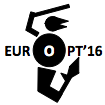
The 7th Workshop on High-Dimensional Approximation
The 7th Workshop on High-Dimensional Approximation will be held at UNSW in Sydney, Australia, on February 13–17, 2017. See the website
http://www.hda2017.unsw.edu.au
The High-Dimensional Approximation (HDA) Workshop is a series of biennial international meetings covering current research on all numerical aspects of high-dimensional problems. This seventh workshop will be held at UNSW in Sydney (HDA2017), with participants again welcomed from all around the world.
The scope of the seventh workshop ranges from high-dimensional approximation theory over computational methods to engineering and scientific applications. Topics include, but are not limited to,
- Sparse grid methods
- Quasi-Monte Carlo methods
- Tensor decompositions
- Polynomial chaos expansions
- Sparse approximations
- Reduced basis methods
- Multi-level methods
- Bayesian inversion
- Uncertainty quantification
Participation is open to all interested in high-dimensional computational mathematics and science.
A key feature of this workshop is that there are no parallel sessions and generally all talks will be of equal length. Participants are welcome to present work in progress and there will be time set aside for informal discussions. The number of talks will be limited. It is not essential that everyone gives a talk. Collaborators are encouraged to coordinate and elect a representative to present joint work.
In this workshop we will honour and celebrate the 65th birthday of Professor Markus Hegland. Markus is a founding member of the HDA workshop series. He is also a well respected leader in computational mathematics and optimization in Australia. We hope to take this opportunity to engage the HDA global community with other computational mathematics groups in Australia.
To assist us with planning, please go to the website at your earliest convenience to register especially if you are interested in giving a talk. Travel, visa and accommodation information is already available. More information about registration fee payment and abstract submission will be available on the website later in the year.
We look forward to welcoming you in Sydney!
Josef Dick, Frances Kuo, Dirk Nuyens
HDA2017 Organizers hda2017@unsw.edu.au







